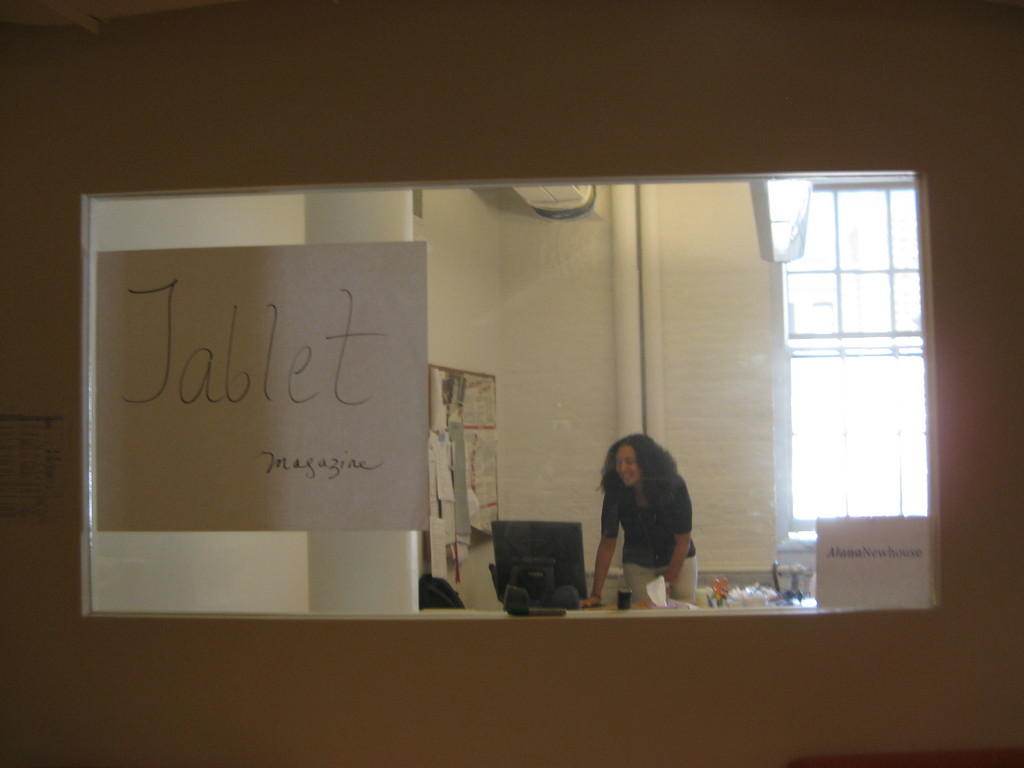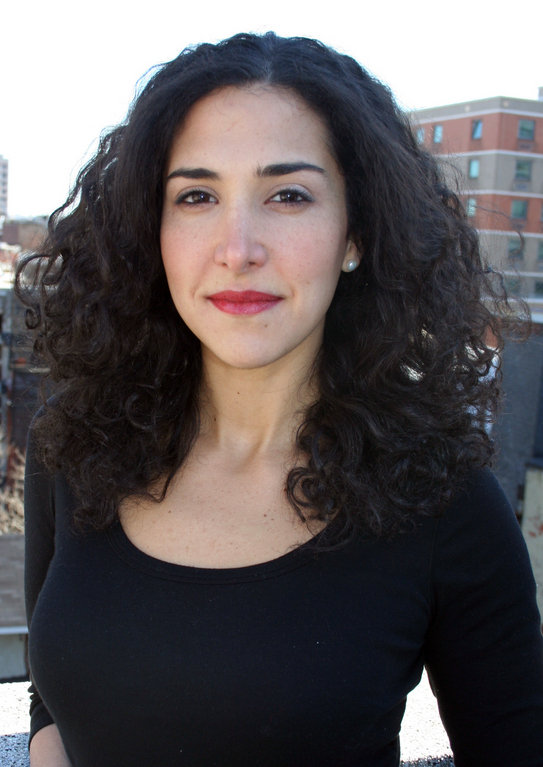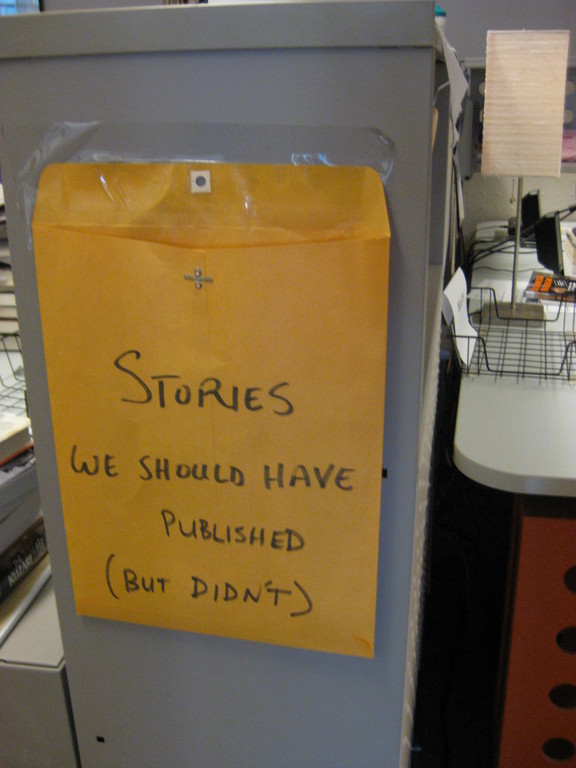A new read on Jewish life: Alana Newhouse and Tablet Magazine
Posted
By Michael Orbach
Issue of September 11, 2009 / 22 Elul 5769
The staff of Tablet Magazine were prepped and ready to launch their website. It was Monday, June 8, 2009, and Tablet had been in production for the last six months; the staff was itching to finally put the site up. The problem: a freak electrical storm was causing power outages all over New York City. But the staff was undeterred and at 2:30 Tuesday morning the site went live. Moments later, as the staff gathered in one of the Tablet offices, a bolt of lightning streaked across the sky.
“Someone joked, ‘If I was an atheist, I’d have to believe now.’” Alana Newhouse recalled three months later in her spacious, cluttered office on Lafayette Street in downtown Manhattan. “Someone else joked that it was like G-d giving the tablets again... It was a moment of real connection.”
In the months since the site went online, Tablet: A New Read on Jewish Life (www.tabletmag.com), has steadily attracted readers from across the Jewish spectrum. The site is a product of Nextbook, a non-profit organization devoted to supporting Jewish culture. The web magazine focuses on three different areas: news and politics, arts and culture, and life and religion, and has come to be regarded as a think tank for what it means to be Jewish in the 21st century. It employs thirteen staff members and includes contributing editors like Seth Lipsky, who founded The Forward and later The New York Sun, and the Atlantic’s Jeffrey Goldberg.
For Newhouse, running Tablet could be seen as the culmination of a career, though she points out that it’s hard to call it a culmination of anything when she’s only 33.
“It’s been a dream,” she said. “Tablet brought together so many streams I opened up throughout my life.”
Newhouse grew up in Lawrence and attended HAFTR. With an Ashkenazic father and Sephardic mother, Alana divided her time between Congregation Beth Sholom in Lawrence and the Sephardic Temple in Cedarhurst, a mix, she says, that defined her sentiment towards Judaism.
“It forced me to engage in both traditions and it made legitimate everyone else’s engagement with Judaism. Do you have a genuine interest in your Jewish identity? If yes, then I’m interested in you,” Newhouse said. “How you manifest that interest is something I can agree with or disagree with.”
After graduating from HAFTR High School in 1993, she went to Barnard University, a time she described as pivotal in her intellectual development. After a stint working for political consultant David Garth, Newhouse returned to Columbia for a journalism degree. While she originally wanted to go into magazine editing, she took a job as an intern at The Forward.
“I felt like I was raised intellectually on The Forward,” Newhouse explained. Her father was a charter subscriber since the paper’s founding in 1990, though she added that her family subscribed to a number of Jewish newspapers including The Jewish Press.
After her internship ended Newhouse became a staff writer for the paper and, under the tutelage of Ami Eden and Andrew Silow-Carroll, became the Arts Editor at age 27. During her widely acclaimed tenure, she started a line of Forward imprints with W.W. Norton. In 2007, with longtime Forward archivist Chana Pollack, Newhouse published the first book, A Living Lens: Photographs of Jewish Life from the Pages of the Forward.
She says that the most inspiring moment for her was going through the Forward archive and finding a letter from then Vice President Harry Truman to his former haberdashery partner, a Jewish man named Edward Jacobson. The letter wasn’t under Truman’s name though.
“It was filed under Jacobson,” Newhouse said, “Not that the relationship [of readers of the Yiddish Forward] was provincial; they had a universe and it was unique and interesting.”
Newhouse was passed over for the position of Editor-in-chief in 2008, a decision a writer for the Huffington Post said could have been the “dumbest media move of the year.” Newhouse moved to Nextbook months later and began preparing to launch Tablet, to replace Nextbook’s earlier website. If anything, she says, her job has deepened her connection to Judaism.
“It hasn’t felt like a conflict. Examining my Judaism hasn’t made me want to abandon it. It made me want to engage with it more,” said Newhouse.
Regarding the principle of Lashon Hora, Newhouse was more direct.
“A big part of your job is speaking about other people — sometimes ill. I think we balance speaking ill with the good of the community,” she explained. “We know that journalism can be radioactive, so we try to use it sparingly and responsibly.”
Newhouse’s office is a reflection of her interests, both Judaic and secular. In one corner, a legless, armless mannequin bedecked in plated gold chains and a Star of David necklace keeps watch, while across the room, an encyclopedic volume of Joyce Carol Oates’ short stories rests on a Philip Roth novel. Behind her desk, a red and white poster outlines the laws of Muktzah (Shabbos prohibitions).
The poster was a gift from her parents when she was in first grade. She even has a favorite, which she pointed out on the yellowed poster: Muktzah machmas kis, a prohibition on objects whose main use and value is forbidden on Shabbos. Examples on the poster included a hammer, a checkbook and a slaughtering knife. For Newhouse, in a complicated world, it’s an easy law to observe.
“I never really carry my slaughtering knife with me,” she said with a laugh.
The staff of Tablet Magazine were prepped and ready to launch their
website. It was Monday, June 8, 2009, and Tablet had been in production for the last six months; the staff was itching to finally put the site up. The problem: a freak electrical storm was causing power outages all over New York City. But the staff was undeterred and at 2:30 Tuesday morning the site went live. Moments later, as the staff gathered in one of the Tablet offices, a bolt of lightning streaked across the sky.
“Someone joked, ‘If I was an atheist, I’d have to believe now.’” Alana Newhouse recalled three months later in her spacious, cluttered office on Lafayette Street in downtown Manhattan. “Someone else joked that it was like G-d giving the tablets again... It was a moment of real connection.”
In the months since the site went online, Tablet: A New Read on Jewish Life (www.tabletmag.com), has steadily attracted readers from across the Jewish spectrum. The site is a product of Nextbook, a non-profit organization devoted to supporting Jewish culture. The web magazine focuses on three different areas: news and politics, arts and culture, and life and religion, and has come to be regarded as a think tank for what it means to be Jewish in the 21st century. It employs thirteen staff members and includes contributing editors like Seth Lipsky, who founded The Forward and later The New York Sun, and the Atlantic’s Jeffrey Goldberg.
For Newhouse, running Tablet could be seen as the culmination of a career, though she points out that it’s hard to call it a culmination of anything when she’s only 33.
“It’s been a dream,” she said. “Tablet brought together so many streams I opened up throughout my life.”
Newhouse grew up in Lawrence and attended HAFTR. With an Ashkenazic father and Sephardic mother, Alana divided her time between Congregation Beth Sholom in Lawrence and the Sephardic Temple in Cedarhurst, a mix, she says, that defined her sentiment towards Judaism.
“It forced me to engage in both traditions and it made legitimate everyone else’s engagement with Judaism. Do you have a genuine interest in your Jewish identity? If yes, then I’m interested in you,” Newhouse said. “How you manifest that interest is something I can agree with or disagree with.”
After graduating from HAFTR High School in 1993, she went to Barnard University, a time she described as pivotal in her intellectual development. After a stint working for political consultant David Garth, Newhouse returned to Columbia for a journalism degree. While she originally wanted to go into magazine editing, she took a job as an intern at The Forward.
“I felt like I was raised intellectually on The Forward,” Newhouse explained. Her father was a charter subscriber since the paper’s founding in 1990, though she added that her family subscribed to a number of Jewish newspapers including The Jewish Press.
After her internship ended Newhouse became a staff writer for the paper and, under the tutelage of Ami Eden and Andrew Silow-Carroll,
became the Arts Editor at age 27. During her widely acclaimed tenure, she started a line of Forward imprints with W.W. Norton. In 2007, with longtime Forward archivist Chana Pollack, Newhouse published the first book, A Living Lens: Photographs of Jewish Life from the Pages of the Forward.
She says that the most inspiring moment for her was going through the Forward archive and finding a letter from then Vice President Harry Truman to his former haberdashery partner, a Jewish man named Edward Jacobson. The letter wasn’t under Truman’s name though.
“It was filed under Jacobson,” Newhouse said, “Not that the relationship [of readers of the Yiddish Forward] was provincial; they had a universe and it was unique and interesting.”
Newhouse was passed over for the position of Editor-in-chief in 2008, a decision a writer for the Huffington Post said could have been the “dumbest media move of the year.” Newhouse moved to Nextbook months later and began preparing to launch Tablet, to replace Nextbook’s earlier website. If anything, she says, her job has deepened her connection to Judaism.
“It hasn’t felt like a conflict. Examining my Judaism hasn’t made me want to abandon it. It made me want to engage with it more,” said Newhouse.
Regarding the principle of Lashon Hora, Newhouse was more direct.
“A big part of your job is speaking about other people — sometimes ill. I think we balance speaking ill with the good of the community,” she explained. “We know that journalism can be radioactive, so we try to use it sparingly and responsibly.”
Newhouse’s office is a reflection of her interests, both Judaic and secular. In one corner, a legless, armless mannequin bedecked in fake gold chains and a Star of David necklace keeps watch, while across the room, an encyclopedic volume of Joyce Carol Oates’ short stories rests on a Philip Roth novel. Behind her desk, a red and white poster outlines the laws of Muktzah (Shabbos prohibitions).
The poster was a gift from her parents when she was in first grade. She even has a favorite, which she pointed out on the yellowed poster: Muktzah machmas kis, a prohibition on objects whose main use and value is forbidden on Shabbos. Examples on the poster included a hammer, a checkbook and a slaughtering knife. For Newhouse, in a complicated world, it’s an easy law to observe.
“I never really carry my slaughtering knife with me,” she said with a laugh.
Report an inappropriate comment
Comments

 46.0°,
Light Drizzle
46.0°,
Light Drizzle 









